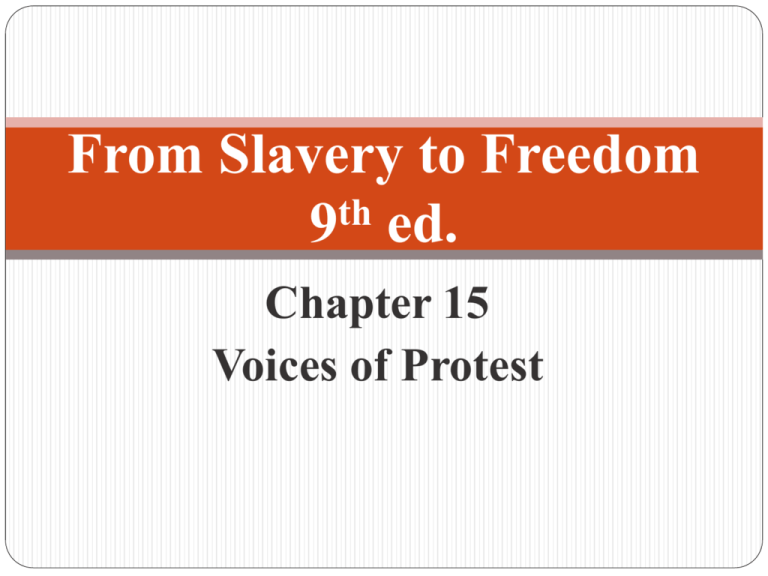
From Slavery to Freedom
th
9 ed.
Chapter 15
Voices of Protest
A Man Was Lynched Yesterday
2
© 2010 The McGraw-Hill Companies, Inc. All Rights Reserved.
Progressive Voices
The Work of the NAACP
NAACP membership as well as circulation of
its magazine The Crisis grew in early 1900s
Legal victories
Guinn v. United States (1915)
Buchanan v. Warley (1917)
Despite successes of NAACP, blacks generally
not beneficiaries of other Progressive-era
reforms
3
© 2010 The McGraw-Hill Companies, Inc. All Rights Reserved.
Progressive Voices
The 1912 Election
Civil rights leaders had great hope for Woodrow
Wilson’s presidency
Wilson Disappoints
Upon election Wilson acted same as other
Southern Progressives
Refused request to form a “national commission on the
Negro problem”
Focused on economic issues such as tariff and banking
reforms that were of less interest to blacks
4
© 2010 The McGraw-Hill Companies, Inc. All Rights Reserved.
Progressive Voices
At the same time, Congress flooded with bills
proposing discriminatory legislation
By executive order Wilson segregated eating and
restroom facilities of black federal employees
and phased out most blacks in civil service jobs
African Americans Protest Racial Policies
Wilson no friend to African American causes
Blacks protested his segregation of federal
employees; occupation of Haiti; and his praise of
film Birth of a Nation
5
© 2010 The McGraw-Hill Companies, Inc. All Rights Reserved.
Progressive Voices
The Amenia Conference
Brought together most distinguished African
Americans of the day to consolidate and achieve
a unity of thought
Agreed to work together for:
Enfranchisement
Abolition of lynching
Enforcement of laws protecting civil rights
6
© 2010 The McGraw-Hill Companies, Inc. All Rights Reserved.
Men and women at the Amenia Conference
7
© 2010 The McGraw-Hill Companies, Inc. All Rights Reserved.
Violent Times
The Resurgent Ku Klux Klan
Postwar “super-patriotism” contributed to rise of
racist and xenophobic groups
Ku Klux Klan reemerged in South in 1915
By 1920s became national organization
Terrorized African Americans and other ethnic
communities; especially targeted black soldiers
Race Riots
“Red Summer”
Twenty-six urban race riots in summer of 1919
8
© 2010 The McGraw-Hill Companies, Inc. All Rights Reserved.
Violent Times
Race relations tense due to continued African
American migration and resulting competition
for jobs
The Chicago Riot of 1919
Most serious racial riot; started with drowning
of black man on a Lake Michigan beach
Chicago without law and order for thirteen days
More Riots
Race riots continued in places such as Knoxville,
TN; Omaha, NE; and Elaine, AR
9
© 2010 The McGraw-Hill Companies, Inc. All Rights Reserved.
Violent Times
Riots continued after 1919
Tulsa, OK; Rosewood, FL; Detroit, MI
“Outside Agitation”
Whites blamed foreign influences for black
protest
Blacks refuted that claim
10
© 2010 The McGraw-Hill Companies, Inc. All Rights Reserved.
Civil Rights Vanguard
The Persistence of Lynching
NAACP persistently fought lynching
Banner; silent parade
Lynchings continued
Rope and Faggot, A Biography of Judge Lynch (1929)
NAACP continued crusade against lynching;
held a national conference; sponsored
antilynching rallies
Thirty Years of Lynching in the United States,
1889-1918
11
© 2010 The McGraw-Hill Companies, Inc. All Rights Reserved.
Civil Rights Vanguard
NAACP Legal Efforts
Took first step toward securing passage of
federal antilynching law in 1919
Southern representatives organized to defeat proposed
bill; spoke in favor of mob rule
Bill eventually filibustered in Senate
Nixon v. Herndon (1927)
12
© 2010 The McGraw-Hill Companies, Inc. All Rights Reserved.
Protesting with Their Feet
The Leaderless Migration
Blacks flooded out of South to North and West
Fear among many that exodus would endanger
the institutional and financial life of the South
It was a leaderless movement; blacks moved
with sense of collective destiny
Migration from the Caribbean
Between 1899 and 1937 more than 140,000
migrants came to U.S. from Caribbean
13
© 2010 The McGraw-Hill Companies, Inc. All Rights Reserved.
Protesting with Their Feet
Afro-Caribbeans in New York
Most came from English-speaking islands
Arthur Alfonso Schomburg came from Puerto
Rico
Established Negro Society for Historical Research
Caribbean migrants disproportionately educated
and skilled
Overrepresented in population of successful New
Yorkers
More visible in radical movements
14
© 2010 The McGraw-Hill Companies, Inc. All Rights Reserved.
New Negroes
Race and Class Politics: Civil Rights, Black
Nationalism
African Americans and Afro-Caribbeans
disagreed over primacy of race vs. class protest
Hubert Harrison
Frustrated by failure of white Left to address racism
within ranks of white working class; founded Liberty
League in 1917
Du Bois and “Close Ranks”
Editors Du Bois and Randolph parted ways over
race-class divide
15
© 2010 The McGraw-Hill Companies, Inc. All Rights Reserved.
New Negroes
Du Bois’s “Close Ranks” article that advocated
for blacks to put race struggle on backseat during
wartime angered black leftists and nationalists
Randolph and Owen defended the Left and
criticized NAACP in The Messenger
Emphasized class struggle
Caricatured Du Bois as an “Old-Style Negro”;“New
Style Negro” portrayed as one who defends himself by
shooting his attackers
Shied away from socialism during the Red Scare
16
© 2010 The McGraw-Hill Companies, Inc. All Rights Reserved.
New Negroes
Marcus Garvey
NAACP failed to secure following of lower class
and poor African Americans; working-class
blacks skeptical of class-based interracial
coalition to fight racism
Garvey filled the void; founded Universal Negro
Improvement Association (UNIA); drew a mass
following
Popularity based on appeal to race pride
Believed hope lied in redeeming Africa from
colonialism; started back-to-Africa movement
17
© 2010 The McGraw-Hill Companies, Inc. All Rights Reserved.
New Negroes
Garvey had mass appeal; created huge black
movement
The Negro World
Denounced by most African American leaders
Garvey’s Decline
Garvey’s “pact” with a representative of the
Ku Klux Klan drew much criticism
Convicted for using the mails to defraud in
raising money for his steamship line;
incarcerated and eventually deported
18
© 2010 The McGraw-Hill Companies, Inc. All Rights Reserved.
New Negroes
Father Divine
George Baker
Interracial religious movement that looked to religion
to foster racial harmony
More than religious cult; addressed followers’ social
and economic needs
19
© 2010 The McGraw-Hill Companies, Inc. All Rights Reserved.
New Women
Black Feminism
Interracial feminism impacted by racism
Black women aware that demand for women’s
rights linked to black disfranchisement and
segregation
To ensure southern congressional endorsement of
suffrage amendment, national suffrage
organizations capitulated to southern racism
20
© 2010 The McGraw-Hill Companies, Inc. All Rights Reserved.
Black suffragist Mary Church Terrell
21
© 2010 The McGraw-Hill Companies, Inc. All Rights Reserved.
Black suffragist Nannie Burroughs
22
© 2010 The McGraw-Hill Companies, Inc. All Rights Reserved.
New Women
Black Women Voters
Ida B. Wells’s Alpha Suffrage Club instrumental
in black voter turnout in Chicago in 1915
With ratification of Nineteenth Amendment in
1920, black women faced same difficulties at
southern voting booths as black men
Black women leaders sought to garner women’s
vote during the great migration
Women’s clubs mobilized black voters
23
© 2010 The McGraw-Hill Companies, Inc. All Rights Reserved.
New Women
Growing Political Involvement
Black people’s political involvement growing
despite fact they were often insulted by those for
whom they had cast their ballots
Black women sought to make their voices heard
within the electoral system
New Negro’s protest overshadowed genteel
feminism advocated by NACW
New Woman exalted as man’s helpmate
Neither New Negro nor New Woman movements
gave due credence to the New Negro Woman
24
© 2010 The McGraw-Hill Companies, Inc. All Rights Reserved.






